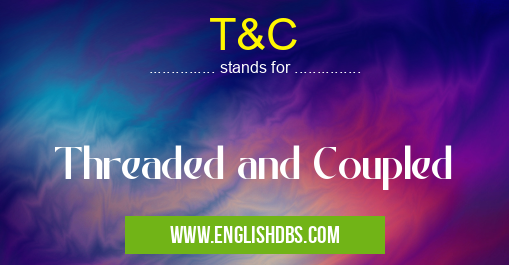What does T&C mean in PRODUCTS
Abbreviations are a common language for the business field. T&C stands for Threaded and Coupled. This term is used to describe a method of assembling two components together, such as piping components or conduit fittings. It is part of the mechanical joining process and can be used to join two parts that need to remain tightly sealed against leakage or contamination.

T&C meaning in Products in Business
T&C mostly used in an acronym Products in Category Business that means Threaded and Coupled
Shorthand: T&C,
Full Form: Threaded and Coupled
For more information of "Threaded and Coupled", see the section below.
Advantages of Threaded & Coupled Connections
The main advantage of threaded & coupled connections is that it allows for quick and easy assembly and disassembly without needing special tools or complex machinery; this work can typically be performed by anyone with basic skills and hand tools on site, significantly reducing labour costs as well as eliminating potential delays due to waiting on additional specialised personnel. Additionally, because no welding or gluing is required there is minimal heat distortion or corrosion build up which could otherwise inhibit proper fitting over time making them ideal for higher vibration applications like pumps and motors where other connection techniques may not provide as reliable an outcome.
Disadvantages of Threaded & Coupled Connections
The main disadvantage of using threaded & coupled connections is that they require exact tolerances and perfect alignment between parts for them to work properly as any misalignment may lead to leaks; this can be especially problematic if working within confined spaces like inside walls or tanks due to lack of space causing improper fitting while also greatly increasing the risk of corrosion due to moisture permeating through any imperfections in the joints. Additionally, threaded connections rely heavily on skilled craftsmanship in order to ensure accuracy while also providing proper tightness each time parts are connected so regular supervision may be needed if inexperienced technicians are performing work onsite,
Essential Questions and Answers on Threaded and Coupled in "BUSINESS»PRODUCTS"
What does "Threaded and Coupled" mean?
Threaded and Coupled is a type of threaded connection used in piping systems. It consists of two pipes or tubes with internal threads that are linked together by coupling. It is used to change the direction of fluid flow, as well as providing a secure joint between two or more components in a system.
What kinds of materials can be used for Threaded and Coupled piping connections?
Typically, these types of connections are made from brass, stainless steel, copper, and carbon steel. Other metals may also be available based on the application needs.
Are Threaded and Coupled pipe fittings easy to install?
Yes, these types of pipe fittings can be installed quickly and easily, without the need for specialized tools or training. Additionally, the threaded design helps to provide a secure fit for both joining pipework sections.
What applications are suitable for Threaded and Coupled connections?
These types of connections are commonly used in plumbing systems such as domestic water supply lines, heating systems, natural gas lines, irrigation systems and general industrial applications.
Is it possible to repair damaged Threaded and Coupled pipes?
Yes. If a section of pipe is damaged or cracked due to corrosion or wear-and-tear it can usually be dismantled easily at the coupling points to replace the affected area with a new section that has been correctly threaded into place.
Are Threaded and Coupled piping connections suitable for high pressure applications?
These types of connectors are best suited for low pressure applications such as domestic water supply lines or other low-pressure pipeline systems. For higher pressure requirements alternative alternatives should be considered instead
What maintenance is needed after installing Threaded & Coupled piping joints?
After installing these types of joints regular inspections should be conducted on them as part of any preventative maintenance plan; this will help identify any potential signs of damage which may require repair works or replacement parts before they become major problems. Additionally ensuring leaking seals are regularly inspected & replaced when needed will help keep the integrity of the pipe system intact over time.
Final Words:
Threaded & coupled connections provide an efficient way to assemble bolted fittings quickly without requiring complicated tools or labour intensive welds. They offer good sealing properties when installed correctly but require exact measurements and tolerances between parts along with quality craftsmanship in order to ensure all fittings remain properly secured preventing any potential leakage which could occur otherwise; this makes it particularly suitable for industrial applications where regular maintenance demands reliable performance even under extreme conditions such as high vibration environments.
